Sleep
Estimated reading time: 15 minutes
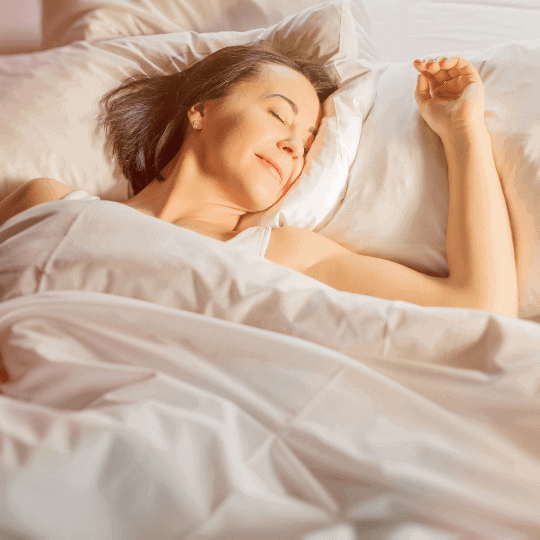
Introduction
A good night's sleep and you wake with superpowers! A bad night can cause a whole array of bad behavior and feelings. Quality nights are both an art and a science, yet the vast majority of us, even those who have perfected every other area of our lives, have difficulties with this. Would it be perfect, if you could get uninterrupted shuteye for a full 8 hours every night? Would you feel completely rejuvenated when you wake up?
The most significant thing you can do to improve your brain function, live longer, and perform better at work and in life is to get enough shut eye. You'll be more awake, more robust to stress, and feel more alive and ready for the day if you get enough sleep.
Traditional wisdom suggests that you sleep more, yet more time in bed does not equal better quality. With the appropriate foods, targeted supplements, and modest, easy practices throughout the day, you can create the conditions for excellent, restorative nights.
Our zzzz's is one of the most significant factors in enhancing your brain function, longevity, and overall performance. We all know this, but many people struggle to improve their evening habits. If you're having trouble getting enough, please read on.
What are the stages of sleep?
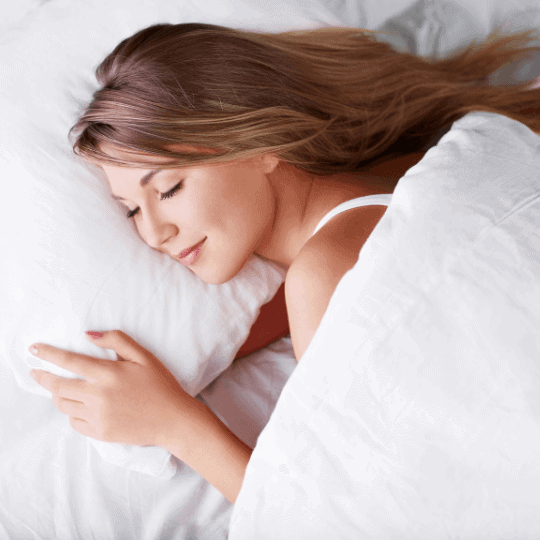
Sleep has been traditionally divided into 4 categories: awake, light, deep, and REM. Each one plays an essential role in maintaining your mental and physical health.
- REM stands for “rapid eye movement” and can also be called “stage R”
- Light sleep
- Deep sleep
What does each stage do?
Each stage plays a different role in preparing your body and mind for the next day.
- Awake time happens before and after falling asleep. It also includes brief awakenings during your shuteye.
- During light sleep, your breathing slows, your heart rate decreases, your body temperature drops and waking up is easy.
- Deep sleep promotes muscle growth and repair. It also flushes brain waste and shows long, slow brain waves.
- REM Sleep supports your brain. During REM, vivid dreams occur and your body becomes immobile to stop you acting out your dreams. It also improves memory, learning, and problem solving.
What should a normal night look like?
The length of time spent in each sleep phase varies greatly across nights and individuals. Your body has enough time during an ideal night's shuteye to cycle through four to five 90-minute cycles that sample different phases as the night continues.
In general, each cycle progresses through the stages of sleep in the following order: wake, light, deep, REM, and repeat. Early-night cycles have a higher amount of deep sleep, while later-night cycles have a higher proportion of REM. By the end of the cycle, your body may decide to forego deep sleep entirely.
Deep sleep is more common in the first half of the night, while REM occurs later in the night.
The majority of the night is spent in light sleep for your body. The amount of time you spend in REM or deep sleep varies greatly from person to person, but the averages for each stage in a single night are listed here.
Every human body is different, and the amount of sleep we need varies from person to person. This is the average numbers of the various stages per night:
- 3:28-3:59 of light sleep (44-51%)
- 1:44-2:00 of REM (22-26%)
- 1:23-1:32 of deep sleep (17-20%)
- 0:43-0:50 awake (9-11%)
Why does it sleep matter?

If you want to be stronger, happier, and more productive, focus on improving your nights. Good sleep is a pillar of high performance, both mentally and physically.
High-quality, restorative sleep carries a number of benefits, including:
- Improves brain function
- Aids in muscle recovery
- Boosts longevity
- Balances your hormones
- Protects your heart
- Fights fat (fun fact: you burn fat via your breath while you sleep)
Related contents
How much sleep do you need?
You've probably heard it said over and over again that getting a decent night's shuteye means getting eight hours of rest. Nevertheless, research has shown that the quality of your sleep, rather than the quantity of it, is the most important factor in your health.
The largest study ever undertaken, with 1.1 million participants, demonstrates that it is quality rather than quantity that is most important. The researchers discovered that people who slept only six and a half hours per night lived significantly longer than those who slept eight hours per night.
It's simple to conclude that shuteye for six and a half hours a night will help you live longer, but the reality is a little more nuanced than that. It's likely that the healthiest people just require less of it than the average person.
So how do you make sure that what you're getting is of the highest quality? Read on for science-backed sleep hacks to help you fall asleep faster and deepen the sleep that you're already getting.
8 SCIENCE-BACKED HACKS TO IMPROVE YOUR SLEEP
1. Protect yourself from junk light!

If you only try one sleep hack, make it this one. It will improve your nights massively. Junk light, which is the blue light emitted by your smartphone, laptop, and tablet screens, is causing you to have trouble sleeping. Too much blue light interferes with your brain's ability to produce melatonin, which is the hormone that signals to your body when it's time to go to bed. Your brain is awakened by blue light, which signals to it that it is daytime. However, screens are not the sole source of unwanted light; street lighting and LED lightbulbs are also responsible.
The best ways to protect yourself from too much blue light exposure:
- Use blackout curtains
- Unplug unnecessary electronics in your bedroom
- Wear blue light blocking glasses from dusk
- Shut down electronic devices one hour before bed
- Increase the warm light setting on your phone
2. Meditate every day!
You turn off the lights at a normal hour, snuggle into your pillow, and… your thoughts begin to race through your head at lightning speed. Did you respond to the email you received from your boss? What should you pack for the kids' lunches the next day? Do you believe in yourself and your abilities? Moreover, why haven't you begun writing that novel, taken that trip, or purchased that house yet? If this sounds familiar, it means that your stress and anxiety are getting in the way of you getting some restful sleep. And that's where the practice of meditation comes in.

Meditation has been shown to considerably reduce stress and anxiety, according to scientific evidence. With meditation, you become more conscious of your habitual thoughts and impulses, and with that consciousness comes more control. You learn to recognize the difference between a constructive and a destructive idea. The practice of meditation also rewires the brain, strengthening neural pathways that help to relax and soothe the nervous system.
Begin by meditating for five minutes every day, then gradually increase your time until you are meditating for 20 minutes. This does not need to be you sitting cross-legged with your hands on your knees chanting an OHMMMM! Laying on your bed listening AND focussing on a guided meditation on YouTube or some relaxing Tibetan singing Bowls is meditating. As long as you keep pushing the inevitable inbound thoughts away and keep coming back to what you are listening to – That's meditation.
3. Try a sleep device!
You know now that it's not about the amount, but the quality of those zzz's. You can deepen the sleep that you're already getting with the help of high-tech sleep devices on the market. For a budget buy, a free smartphone sleep app like Headspace offers “sleepcasts” that can help you drift off to dreamland. On the higher-end, wearable sleep devices like headbands and rings measure your sleep, and in the case of headbands, increase the number of your slow brain waves. The result? Deeper, more restorative sleep.
For a non-electronic option, weighted blankets are the sleep aid du jour. Fans of these heavy blankets — they can weigh anywhere from two to 24 pounds — claim they improve the quality of your nights and ease anxiety.
4. Figure out your chronotype!

It is indeed time to debunk certain long-held myths: Getting out of bed in the morning does not make you a better person. It is not always the case that the early bird gets the worm…. Your circadian rhythm is your internal body clock, and it will be different from the one your next-door neighbor has. When you sleep and wake up in accordance with your body's natural circadian rhythm, you'll sleep better and be more awake and productive during the day. This is according to the research. Dr. Michael Breus, a clinical psychologist, and sleep expert. He has discovered four types of chronotypes that occur during the night (aka your circadian rhythm personality).
These are:
Bear: Most people fall into this category. Bears' circadian rhythm follows the sun, and they sleep easily. If you're a bear, recharge during the mid-afternoon, when bears feel an energy dip.
Wolf: If you're a night person (aka wolf), burn the midnight oil and go to bed later so there will be less tossing and turning. Get most of your work done between noon and 2 pm, and around 5 pm — those are wolves' most productive times of the day.
Lion: Lions wake up early and power through the morning. If you're a lion, go to bed early instead of binging on Netflix.
Dolphin: If you struggle to fall asleep and wake up frequently during the night, you're a dolphin. Schedule your most demanding work between mid-morning and early afternoon.
5. How you lay matters!
You probably don't lose any sleep thinking about the best sleeping position. But how you lay can have a surprisingly big impact on your performance.
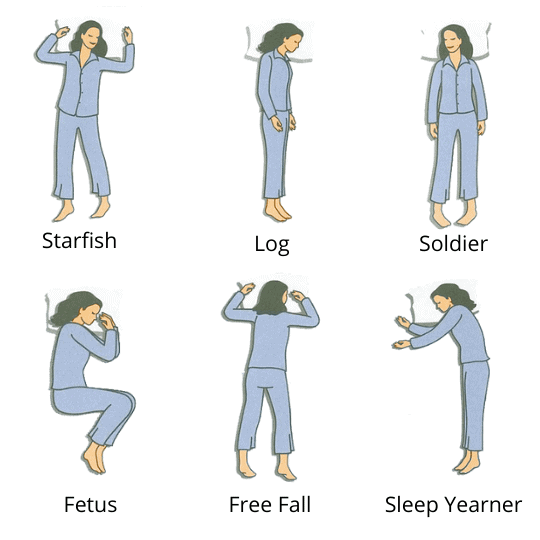
Positions
Fetal position: Turns out, many of us still sleep like we did when we were infants. A whopping 47% of us sleep in this curled-up manner and it's considered the most common sleep position. Women are also more likely to lay in this position compared to men (54% vs. 39%)
Freefall position: People who lie on their stomachs, with their heads turned to the side and their arms under or wrapped around a pillow, comprise 17% of the population studied. Despite being the second most popular sleeping position, about one-quarter (26%) of us consider it the worst sleeping position. Introverts also report having the strongest aversion to this position, so try not to ask them too many questions about it!
Yearner position: Can't find the right sleeping position for you? If you're yearning for a good night's sleep, look no further than the Yearner position (no pun intended.) A close third – with 13% of us sleeping this way – the position consists of lying on your side with both arms out in front of your body.
Soldier position: A soldier may be a person who serves in the military, but it's also the name of the fourth most common sleeping position, preferred by 11% of the population studied. Those who lie on their backs with their arms down and close to the body when they sleep are more likely than those who sleep in the Fetal, Freefall or Yearner positions to either not change positions or only change positions once.
Starfish position: Sleepers who prefer to sleep like marine invertebrates account for 7% of the population studied. These sleepers, who lie on their backs with arms up near their heads or pillows, along with Log sleepers, are more likely to sleepwalk.
Log position: A log is more than a hunk of wood that you throw on a fire to keep you warm. It's actually one of the six main sleeping positions, and 6% of the population sleeps this way. Despite being the least popular sleep position, those who sleep on their sides with both arms down consider themselves healthier than those who sleep in the other positions.
Or try a revolutionary sleep hack — raise the top of your bed frame by a few inches. Sleeping at a small incline helps your brain flush out the debris that has built up during the day, in a process known as lymphatic drainage.
6. Fill your plate with the right fats!
When it comes to quality zzz's, what you eat matters. Despite its importance, the brain is the heaviest organ in the body. High-quality fats, such as grass-fed butter and wild-caught fish, nourish your brain, allowing it to do its job – repair itself while you sleep. The body is amazing!
The appropriate fats also help to maintain a stable blood sugar level and keep hunger pangs at bay. You'll be less likely to find yourself rummaging through the refrigerator at midnight if you have some good fat at dinner. Consider blending up to 1 tablespoon of high-quality MCT Oil into a cup of herbal tea before bedtime for an extra fat boost to help you sleep better.
7. Supplements to help!

Sleep medication can be helpful for a lot of people – but also terribly habit-forming. Others really benefit from just the right kind of support from supplements. The good news is that a lot of non-habit-forming supplements can help you relax, fall asleep and get better-quality rest. Get the full list of the best sleep supplements here.
Here's a summary of the top ones:
Vitamin D: Low levels of vitamin D are linked with poor quality sleep. There's a strong chance you're deficient in it — more than half the world's population isn't getting enough of this vital nutrient. Get your daily dosage of vitamin D with your CBD oil
CBD/CBN: Cannabidiol and Cannabinol have shown great results in enhancing the quality of your sleep. Affecting your endocannabinoid system by creating homeostasis gives your body the opportunity to sleep deeper for longer, without waking up several times during the night.
Krill Oil: Oily fish like sardines, krill, and salmon are full of brain-boosting omega-3 fatty acids, which research shows improve sleep and help you fall asleep faster. Eat at least three servings of fatty fish a week, or take two krill oil supplements (1,560 mg of omega-3's), twice a day, with meals.
Magnesium: Supplementing with magnesium can help you nod off and sleep more deeply. It does this by lowering stress and regulating melatonin. Supplement with 600 to 800 milligrams of magnesium a day, or take an Epsom salt bath before turning in for the night.
8. Stay cool!
Which category of “sleeper” do you fall into? While some people like to keep their bedrooms cool because they “sleep hot,” others prefer to crank up the bedroom temperature because they “sleep cold.”
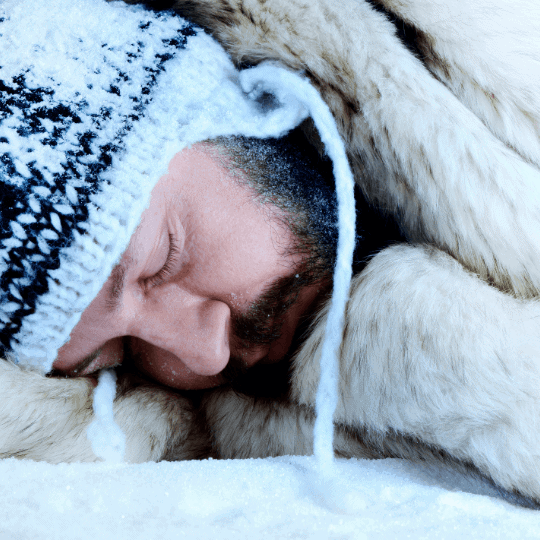
It can pose for an interesting debate — especially if you're sharing a bed/bedroom with someone who doesn't quite vibe with your style. But it is possible to find a healthy and happy medium.
Being hot during the night can reduce both deep and REM, primarily during the first sleep cycle of the night. Even after several nights of being hot, the body will then struggle to acclimate to sleeping in the heat. According to some researchers, our bodies require us to wake up after being exposed to heat in order to maintain a consistent core temperature. This effect can be increased by high humidity levels.
Cold exposure has the greatest impact on sleep later in the night when REM dominates over deep sleep. However, these effects are more pronounced if you are semi-nude. Pajamas and bedding assist in maintaining a sufficiently warm environment and can counteract cold bedroom temperatures, thereby reducing sleep disruptions.
Sleeping cold, on the other hand, has been shown by researchers to affect cardiovascular activity as well as increase the morning blood pressure surge, a natural phenomenon that occurs in all adults.
Our bodies are more sensitive to air temperatures during REM, which could explain why cold exposure has a greater impact later in the night when REM is dominant.
So, now that you know it's not ideal to spend the night in too hot or too cold, what is the best sleeping temperature? Typically, it is suggested that the optimal temperature in the bedroom for adults should be between 18 and 20 degrees C. This range of temperature is thought to actually help facilitate the stability of REM.
When night falls it helps us realize the value of life and every dawn comes with new hope and opportunities. Good Night and sleep tight!
-
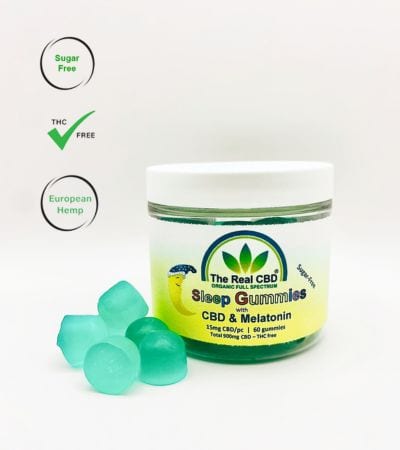 CBD Sleep Gummies€29.00
CBD Sleep Gummies€29.00 -
Product on sale
 HHC VapeOriginal price was: €55.00.€35.00Current price is: €35.00.
HHC VapeOriginal price was: €55.00.€35.00Current price is: €35.00. -
Product on sale
 CBD Vape – Broad Spectrum€30.00 – €45.00
CBD Vape – Broad Spectrum€30.00 – €45.00 -
 CBD Sleep Support Pack€108.00
CBD Sleep Support Pack€108.00 -
 CBD Anti Anxiety Pack€179.00
CBD Anti Anxiety Pack€179.00 -
 CBD Anti Stress Pack€110.00
CBD Anti Stress Pack€110.00 -
 CBD/CBN and Melatonin Soft Gel Capsules€60.00
CBD/CBN and Melatonin Soft Gel Capsules€60.00 -
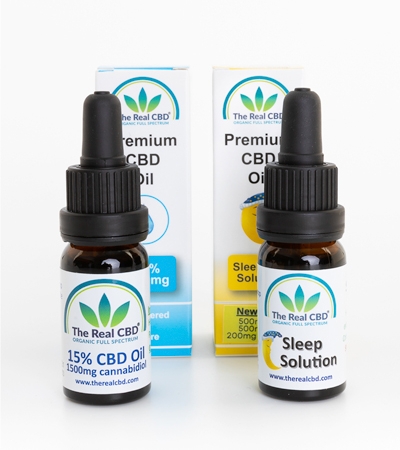 CBD Morning and Evening Pack€102.00
CBD Morning and Evening Pack€102.00 -
 CBD Sleep Well Pack€79.00
CBD Sleep Well Pack€79.00 -
 CBD Good Night Pack€59.00
CBD Good Night Pack€59.00 -
 CBD Sleep Solution 10%€50.00
CBD Sleep Solution 10%€50.00

I am a certified expert in Medicinal Cannabis. We are all about giving correct and trustworthy information. We know how important it is to learn about CBD and cannabis, which is why we want to be your go-to source for trustworthy information. We help you improve your health by using our knowledge and experience as a starting point.



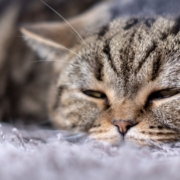




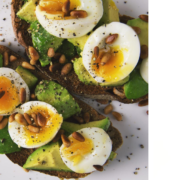





Leave a Reply
Want to join the discussion?Feel free to contribute!